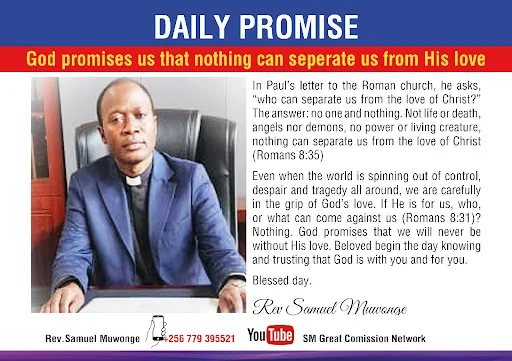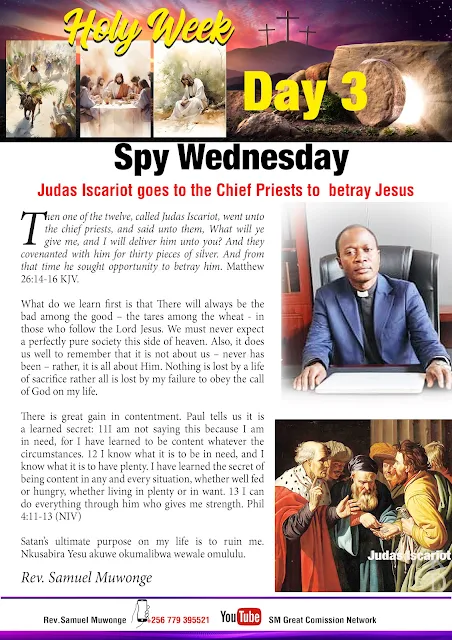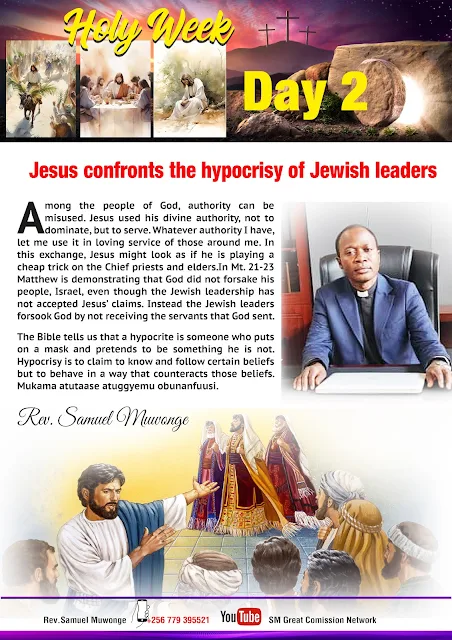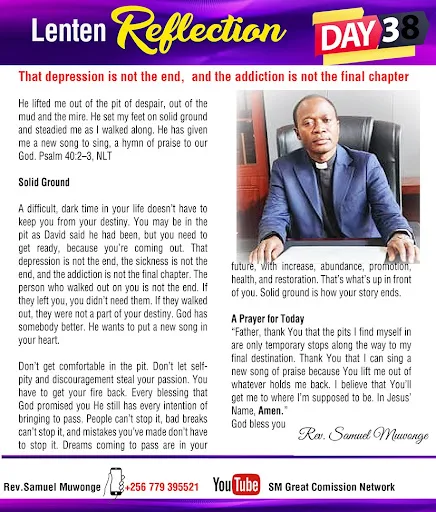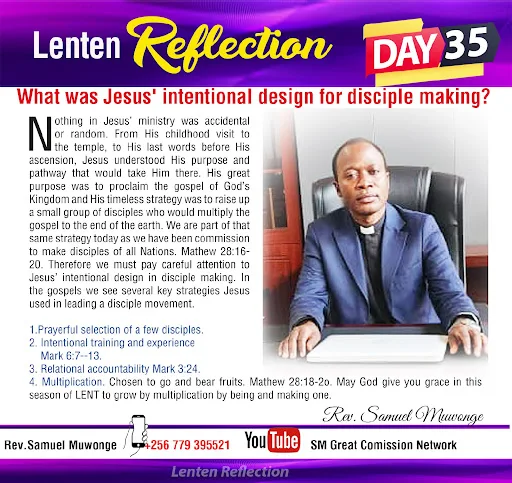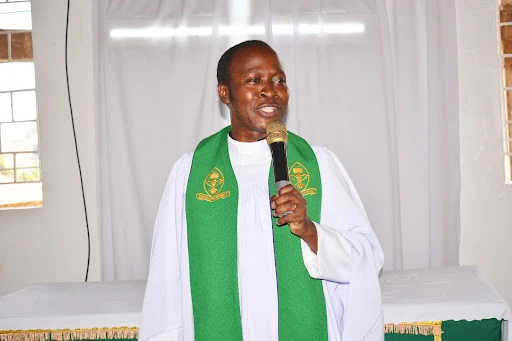Search This Blog
Wednesday, April 30, 2025
DAILY PROMISE: God promises to be near
Monday, April 28, 2025
Daily Promise:God will give you peace
Thursday, April 24, 2025
DAILY PROMISE: God promises to protect you
DAILY PROMISE: God Heals you.
Wednesday, April 23, 2025
Daily Promise: GOD HAS MADE YOU A NEW CREATION
“This means that anyone who belongs to Christ has become a new person. The old life is gone; a new life has begun!” 2 Corinthians 5:17
Tuesday, April 22, 2025
Daily Promise: God promises to work everything together for good
Monday, April 21, 2025
Daily Promise: God promises us that nothing can seperate us from His love
Thursday, April 17, 2025
Good Friday: THE CROSS - Three Powerful Things the Cross of Jesus Does for you
Rev. Muwonge and Online friends donate uniforms to Kasanje Church of Uganda Primary School Pupils
 |
| Rev Samuel Muwonge with pupils of Kasanje C/U Primay School |
The children could not hide their excitement after Reverend Muwonge announced that he and his online friends had bought them school uniforms so that they resurrect together with the risen Christ.
Abaana abo baweeredwa uniform c/o Rev Muwonge and online friends |
| Children respond to an alter call |
HOLY THURSDAY
This day reminds us that Christianity is all about love and service.
Holy thursday , we are reminded of humility and service.
Today Jesus Christ gave a new commandment "Love one another"
 |
| Rev Muwonge prays for the children |
Wednesday, April 16, 2025
HOLY THURSDAY: Meaning and importance of the last supper
The LAST SUPPER its all about love and service.
Holy Thursday , we are reminded of humility and service.
Today Jesus Christ gave a new commandment “Love one another”
The Last Supper is what we call the last meal Jesus ate with His disciples before His betrayal and arrest. The Last Supper is recorded in the Synoptic Gospels (Matthew 26:17–30; Mark 14:12–26; Luke 22:7–30). It was more than Jesus’ last meal; it was a Passover meal, as well. One of the important moments of the Last Supper is Jesus’ command to remember what He was about to do on behalf of all mankind: shed His blood on the cross thereby paying the debt of our sins (Luke 22:19).
In addition to predicting His suffering and death for our salvation (Luke 22:15–16), Jesus also used the Last Supper to imbue the Passover with new meaning, institute the New Covenant, establish an ordinance for the church, and foretell Peter’s denial of Him (Luke 22:34) and Judas Iscariot’s betrayal (Matthew 26:21–24).
The Last Supper brought the Old Testament observance of the Passover feast to its fulfilment. Passover was an especially holy event for the Jewish people in that it commemorated the time when God spared them from the plague of physical death and brought them out of slavery in Egypt (Exodus 11:1—13:16). During the Last Supper with His apostles, Jesus took two symbols associated with Passover and imbued them with fresh meaning as a way to remember His sacrifice, which saves us from spiritual death and delivers us from spiritual bondage: “After taking the cup, he gave thanks and said, ‘Take this and divide it among you. For I tell you I will not drink again from the fruit of the vine until the kingdom of God comes.’ And he took bread, gave thanks and broke it, and gave it to them, saying, ‘This is my body given for you; do this in remembrance of me.’ In the same way, after the supper he took the cup, saying, ‘This cup is the new covenant in my blood, which is poured out for you’” (Luke 22:17–20).
Jesus’ words during the Last Supper about the unleavened bread and the cup echo what He had said after He fed the 5,000: “I am the bread of life. Whoever comes to me will never go hungry, and whoever believes in me will never be thirsty. . . . I am the living bread that came down from heaven. Whoever eats this bread will live forever. This bread is my flesh, which I will give for the life of the world. . . . Whoever eats my flesh and drinks my blood has eternal life, and I will raise them up at the last day. For my flesh is real food and my blood is real drink” (John 6:35, 51, 54–55). Salvation comes through Christ and the sacrifice of His physical body on the cross.
Also during the Last Supper, Jesus taught the principles of servanthood and forgiveness as He washed His disciples’ feet: “The greatest among you should be like the youngest, and the one who rules like the one who serves. For who is greater, the one who is at the table or the one who serves? Is it not the one who is at the table? But I am among you as one who serves” (Luke 22:26–27; John 13:1–20).
The Last Supper today is remembered during the Lord’s Supper, or communion (1 Corinthians 11:23–33). The Bible teaches that Jesus’ death was typified in the offering of the Passover sacrifice (John 1:29). John notes that Jesus’ death resembles the Passover sacrifice in that His bones were not broken (John 19:36; cf. Exodus 12:46). And Paul said, “Christ, our Passover lamb, has been sacrificed” (1 Corinthians 5:7). Jesus is the fulfilment of the Law, including the feasts of the Lord (Matthew 5:17).
Typically, the Passover meal was a family celebration. However, at the Last Supper, the apostles were alone with Jesus (Luke 22:14), which suggests that this particular meal has specific meaning for the church, of which the apostles became the foundation (Ephesians 2:20). While the Last Supper had implications for the Jews, it was designed for the church as well. Today the Lord’s Table is one of two ordinances observed by the church.
The Last Supper was rooted in the Old Covenant even as it heralded the New. Jeremiah 31:31 promised a New Covenant between God and Israel, in which God said, “I will put my law in their minds and write it on their hearts. I will be their God, and they will be my people” (Jeremiah 31:33). Jesus made a direct reference to this New Covenant during the Last Supper: “This cup is the new covenant in my blood” (Luke 22:20). A new dispensation was on the horizon. In God’s grace, the New Covenant applies to more than Israel; everyone who has faith in Christ will be saved (see Ephesians 2:12–14).
The Last Supper was a significant event and proclaimed a turning point in God’s plan for the world. In comparing the crucifixion of Jesus to the feast of Passover, we can readily see the redemptive nature of Christ’s death. As symbolized by the original Passover sacrifice in the Old Testament, Christ’s death atones for the sins of His people; His blood rescues us from death and saves us from slavery. Today, the Lord’s Supper is when believers reflect upon Christ’s perfect sacrifice and know that, through our faith in receiving Him, we will be with Him forever (Luke 22:18; Revelation 3:20).
Rev. Samuel Muwonge
N.B Don’t forget the victory night tomorrow at St Stephen Kitende C.O.U. 7pm to 6am.
Tuesday, April 15, 2025
HOLY WEDNESDAY / SPY WEDNESDAY: Judas Iscariot approaches the High Priests to betray Jesus
Then one of the twelve, called Judas Iscariot, went unto the chief priests, and said unto them, What will ye give me, and I will deliver him unto you? And they covenanted with him for thirty pieces of silver. And from that time he sought opportunity to betray him. Matthew 26:14-16 KJV.
What do we learn first is that There will always be the bad among the good – the tares among the wheat - in those who follow the Lord Jesus. We must never expect a perfectly pure society this side of heaven. Also, it does us well to remember that it is not about us – never has been – rather, it is all about Him. Nothing is lost by a life of sacrifice rather all is lost by my failure to obey the call of God on my life.
There is great gain in contentment. Paul tells us it is a learned secret: 11 I am not saying this because I am in need, for I have learned to be content whatever the circumstances. 12 I know what it is to be in need, and I know what it is to have plenty. I have learned the secret of being content in any and every situation, whether well fed or hungry, whether living in plenty or in want. 13 I can do everything through him who gives me strength. Phil 4:11-13 (NIV)
Satan’s ultimate purpose on my life is to ruin me. Nkusabira Yesu akuwe okumalibwa wewale omululu.
Monday, April 14, 2025
Holy Week. Tuesday Reflection: Jesus confronts the hypocrisy of Jewish leaders
The Bible tells us that a hypocrite is someone who puts on a mask and pretends to be something he is not. Hypocrisy is to claim to know and follow certain beliefs but to behave in a way that counteracts those beliefs. Mukama atutaase atuggyemu obunanfuusi.
Sunday, April 13, 2025
Holy week day 1
Friday, April 11, 2025
Olunaku olwa 30 nga twefumiitiriza ku kisiibo
Okugonjoola enkaayana
Mu kitabo kyange ku bufumbo ekisangibwa mu Cathedral Resource Centre, Entebbe Bookshop, Uganda Bookshop nkikozeeko kino ku lupapula 67--75.
Leero ka tulabe engeri gye tuyinza kugonjoola enkaayana ng’abafumbo.
1. Beera ng’omuyizi. Mwembi mujja kuwangula ku nkomerero singa mwembi musobola okuyiga n’okukula ng’oyita mu bumanyirivu. Ekyo kiteeke nga ekigendererwa kyo okuva ku ntandikwa. Kasita omala okukitegeera nti waliwo okusika omuguwa, ekisinga obukulu si kufuula munno kutegeera ndowooza yo, okumumatiza/ ye nti oli mutuufu, oba okuwangula ensonga. Wabula ekikulu kwe kuyiga ekintu eky’omuwendo ekijja okukuyamba okufuuka omuntu Katonda b’ayagala obeere.
2. Wuliriza n’emitima gyammwe. “Okuddamu n’eggonjebwa kukyusa ekuruyi: Naye ekigambo eky’ekkayu kisaanuula obusungu.” (Engero 15: 31). Ojja kutuuka ku kikolo ky’ekizibu era okikolere mangu, singa oyita munno akubuulire ky’awulira, ebyetaago byabwe bye biruwa, engeri gye bandyagadde okuddamu, ne ky’osobola okukola kati okuyamba okugonjoola ekizibu mu ngeri ejja okuba esinga obulungi gye bali. Ekigendererwa kirina okuba okuwuliriza n’obwegendereza, okuwuliriza “ n’amaaso go,” n’okutegeera si bigambo byabwe byokka wabula n’enneewulira z’omwoyo gwabwe. Weewale okukemebwa okuwa eby’okuddamu eby’amangu.
3. Enneewulira zo zikuume nga zifugibwa.
Obusungu tebujja kukola kintu kyonna mu kugonjoola obutakkaanya oba mu kutuyamba okukula, “......Kubanga obusungu bw’omuntu tebukola butuukirivu bwa Katonda.” (Yakobo 1: 20) .
Katonda ayagala tukiteeke ku ffe (Abaefeso 4: 31). Saba okwefuga ku nneewulira zo.
4. Lowooza nga tonnaba kwogera.
Abamu ku ffe tulina emimwa gyaffe mu ntambula nga ebirowoozo byaffe tebinnaba kuli mu ggiya. Era bwe tuba nga tugezaako okugonjoola enjawulo, ekyo kiringa okuyiwa petulooli ku manda agookya. Okusirika okugaziyizibwa kuzimba okusika omuguwa kubanga kutera okutaputibwa ng’obutakkaanya. Naye okusirika okumu kuba kulungi singa tukozesa kitono okulowooza ku bye twagala okwogera n’engeri gye tusaanidde okukyogera. “ Okuddamu n’eggonjebwa kukyusa ekuruyi: Naye ekigambo eky’ekkayu kisaanuula obusungu.” (Ngero 15: 1). Mazima ddala tetwagala kusika busungu bulala nga tugezaako okugonjoola obutakkaanya. Twagala ebigambo byaffe bikkakkane n’okusirisa embeera ejja okutwala ebirowoozo ebimu. Mu kiseera kino eky’Ekisiibo Katonda akuyambe okugonjoola entalo zonna era obeere n’emirembe.
Rev. Samuel Muwonge.
Lenten Reflection Day 39: Conflict Management
Conflict Management
In my book Marriage instruction manual found at Cathedral resource centre, Entebbe bookshop, Uganda Bookshop I have addressed this on page 67--75.
Today lets look at how we can manage conflicts as marrieds.
1. Adopt a learner’s posture. Both of you will win in the end if you can both learn and grow through experience. Set that as your aim from the very beginning. Once yoh realise there is tension, the most important thing is not making the other person understand your point of view, convincing him/ her that you are right, or winning the argument. Instead, the important thing is to learn something valuable that will help you become the people God wants you to be.
2. Listen with your hearts. “He whose ear listens to the life-giving reproof will dwell among the wise.” (Proverbs 15: 31). You will get to the root of the problem and work it out more readily, if you invite your spouse to tell you what they are feeling, what their needs are, how they would have liked to respond, and what you can do now to help resolve the problem in a way that will be best for them. The goal should be to listen attentively, to listen “ with your eyes,” and to understand not only their words but the feelings of their soul. Avoid the temptation of giving quick answers.
3. Keep your emotions under control.
Anger will never make a contribution to resolving a conflict or in helping us to grow, “......for the anger of man does not achieve the righteousness of God.” (James 1: 20)
God wants us to put it away from us (Ephesians 4: 31). Pray for self-control over your emotions.
4. Think before you speak.
Some of us have our mouths in motion before our minds are in gear. And if we are trying to resolve a difference, that is like pouring petrol on burning charcoal. Extended silence builds tension because it is usually interpreted as disagreement. But some silence is good if we use sparingly to think about what we want to say and how we should say it. “ A gentle answer turns away wrath, but harsh words stir up anger” (Prov. 15: 1). We certainly don’t want to stir up any more anger when we’re trying to resolve a conflict. We want our words to calm and quiet the situation that will take some forethought. In this season of LENT may God help you manage all conflicts and have peace.
Rev. Samuel Muwonge.
Thursday, April 10, 2025
Okufumiitiriza ku kisiibo olunaku 38
Lenten Reflection Day 38
Wednesday, April 9, 2025
Lenten Reflection Day 37
Era nga bwe mwagala abantu okubakolanga, nammwe mubakolenga bwe mutyo. Lukka 6:31
“N’olwekyo, ng’abantu ba Katonda abalonde, abatukuvu era abaagalwa ennyo, mwennyambe n’okusaasira, ekisa, obwetoowaze, obuwombeefu n’obugumiikiriza. Mugumiikiriza munne era musonyiwe munne singa wabaawo omu ku mmwe alina okwemulugunya ku muntu. Musonyiwe nga Mukama akusonyiwa. Era empisa zino zonna ziteeka ku kwagala, ekiba kikwatira wamu byonna mu butuukirivu.” —Abakoolosayi 3:12-14 .
“Abaganda ne bannyinaffe, tebavumagana. Omuntu yenna ayogera ku muganda we oba mwannyinaffe oba abalamuzi ayogera ku mateeka n’asala omusango. Bw’osala omusango gw’amateeka, oba togukuuma, wabula otudde mu kusalawo ku nsonga eyo.” —Yakobo 4:11.Bya Rev Samuel Muwonge .
Rev. Samuel Muwonge
Lenten Reflection Day 36 And who is the burden-bearer in 1 Peter 5:7?
Monday, April 7, 2025
Construction of vestries at St. Stephen's Kitende on a steady path of progress.
LENTEN Reflection day 35. What was Jesus' intentional design for disciple making? Nothing in Jesus' ministry was accidental or random. From His childhood visit to the temple, to His last words before His ascension, Jesus understood His purpose and pathway that would take Him there. His great purpose was to proclaim the gospel of God's Kingdom and His timeless strategy was to raise up a small group of disciples who would multiply the gospel to the end of the earth. We are part of that same strategy today as we have been commission to make disciples of all Nations. Mathew 28:16---20. Therefore we must pay careful attention to Jesus' intentional design in disciple making. In the gospels we see several key strategies Jesus used in leading a disciple movement.1.Prayerful selection of a few disciples.2. Intentional training and expereiencemark 6:7--13.3. Relational accountability mark 3:24.4. Multiplication. Chosen to go and bear fruits. Mathew 28:18--2o. May God give you grace in this season of LENT to grow by multiplication by being and making one.Rev Samuel Muwonge.
1.Prayerful selection of a few disciples.
2. Intentional training and expereiencemark 6:7--13.
3. Relational accountability mark 3:24.
4. Multiplication. Chosen to go and bear fruits. Mathew 28:18--2o. May God give you grace in this season of LENT to grow by multiplication by being and making one.
Rev Samuel Muwonge.
Nothing in Jesus' ministry was accidental or random. From His childhood visit to the temple, to His last words before His ascension, Jesus understood His purpose and pathway that would take Him there. His great purpose was to proclaim the gospel of God's Kingdom and His timeless strategy was to raise up a small group of disciples who would multiply the gospel to the end of the earth. We are part of that same strategy today as we have been commission to make disciples of all Nations. Mathew 28:16---20. Therefore we must pay careful attention to Jesus' intentional design in disciple making. In the gospels we see several key strategies Jesus used in leading a disciple movement.
1.Prayerful selection of a few disciples.
2. Intentional training and expereiencemark 6:7--13.
3. Relational accountability mark 3:24.
4. Multiplication. Chosen to go and bear fruits. Mathew 28:18--2o. May God give you grace in this season of LENT to grow by multiplication by being and making one.
Rev Samuel Muwonge.
Kiki Yesu kye yakola mu bugenderevu mu kulonda abayigirizwa?
Sunday, April 6, 2025
Okufumiitiriza ku kisiibo Olunaku 34
Lenten Reflection Day 34
St. Stephen's Kitende Tuesday Lunch hour uses Anglican Hymns for Praise and Worship
By Hannington Sebuliba Of recent, Anglican Churches had abandoned their melodious opting for short choruses commonly used in P...

-
ministry was accidental or random. From His childhood visit to the temple, to His last words before His ascension, Jesus unders...
-
Rev. Samuel Muwonge preaching to students Kitende S.S. God heals the broken hearted I surrender all to Jesus Student...
-
"Do to others as you would have them do to you." —Luke 6:31 "Therefore, as God's chosen people, holy and dear...






